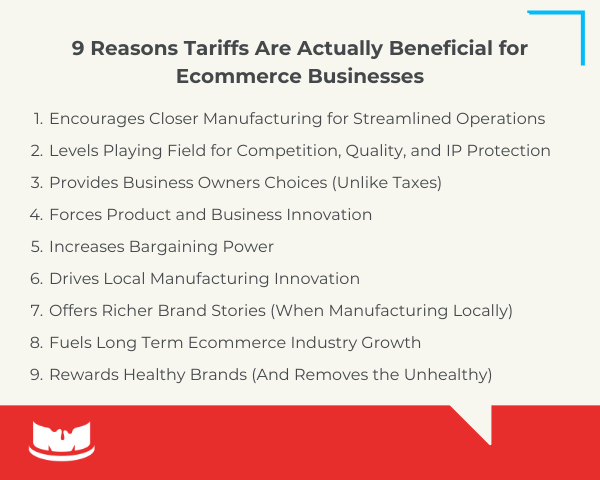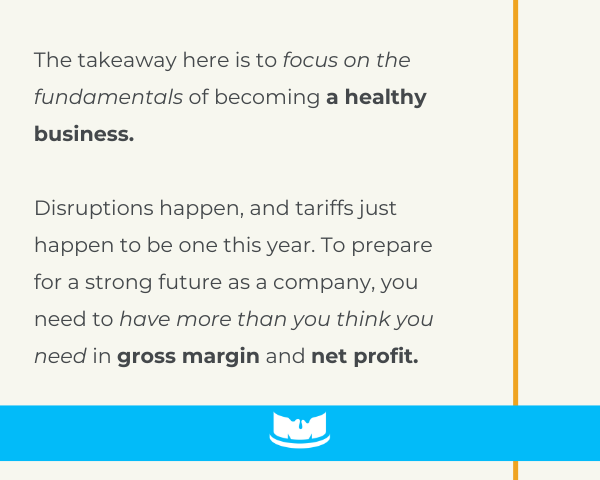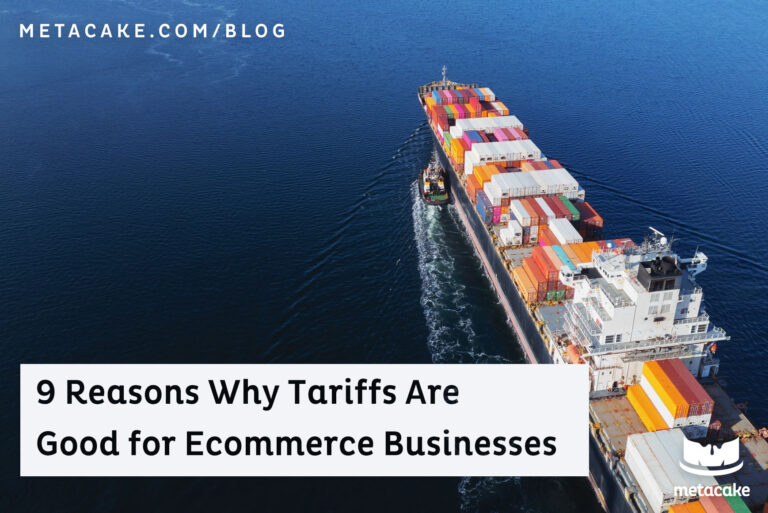Disruptions in business (and life) are inevitable. You cannot avoid them, so you might as well use them to become stronger. Tariffs are no different.
Tariffs enacted by President Trump are rocking the business world, especially for ecommerce companies. It’s true that these tariffs have the potential to severely impact ecommerce brands—that is, the ones that don’t follow healthy growth principles. But for the brands that are healthy, this disruption may be the most helpful shift that could have ever happened.
In this post, we’ll dive into 9 reasons why President Trump’s tariffs are actually a good thing for your ecommerce brand, your customers, and certainly the industry as a whole. But there is one industry the tariffs might be detrimental for—so make sure this isn’t you.
Why Tariffs Are Actually a Good Thing for Your Ecommerce Brand
The truth is, any disruption creates a massive opportunity for businesses that are healthy enough to take advantage of it. Tariffs are no different. Let’s get into nine reasons why we think this could be a positive shift for ecommerce, based on our experience of coaching and owning ecommerce brands for over 20 years.

Reason 1: Tariffs Move Manufacturing Closer, Streamlining Operations
The typical process for manufacturing an ecommerce product has become cumbersome (to put it mildly), with massively long lead times, language barriers, quality issues and trust issues.
Most businesses design a product, and then find potential manufacturers (typically in China)—which can be quite a lengthy process, often with a language barrier. Then, once you choose your manufacturer, the back-and-foth continues for getting samples, which takes several weeks. You might also find yourself faced with quality issues, miscommunications, and more delays. When you and the manufacturer are ready to actually create your first shipment of products, it could take several weeks or months to create. And then it will need to be transported overseas—which means more waiting.
Tariffs add another piece to this puzzle. How much extra will you need to pay to bring your product over? Will there be additional time delays in customs?
That leads us to the first reason why tariffs are beneficial: It will help bring manufacturing closer to home. That is helpful because it can be easier across all fronts—from communication to shipping timelines for you and for your customers. It’s also easier to avoid dishonest manufacturing business practices, as it will be easier to identify whether you’re working with an upstanding company or not.
The more local manufacturing becomes, the better it will be for your business and your customers, giving you a massive advantage in the future. Local manufacturing is worth pursuing, because business rewards speed.
Reason 2: Tariffs Level the Playing Field for Competition, Quality, and IP Protection
Selling products online has become so accessible that just about anyone can do it. People can sell from anywhere, to customers all over the world. This unfortunately has created a flooded marketplace where quality brands with great products have to struggle to compete against cheap knock-offs.
In fact, IP theft is a real problem. Every time one of our brands launches a new product, very often it eventually gets knocked off with a cheaper copycat product. In the US, there are laws for patent protection, trademark protection, IP protection, and more. But when working with manufacturers overseas, such as in China, that protection doesn’t always apply, and it doesn’t keep international manufacturers from stealing your product design.
This is an area that is not often discussed. Some brands don’t even know it’s happening. But it’s a real problem if your manufacturing partner is actively undercutting you by selling your product to competitors or directly to consumers under a different name.
For example, a few years back, the Chinese manufacturer for a very popular shoe company reached out to our team. They were interested in partnering with us to create a new brand that sells the exact same product, under a different label for a cheaper price. We obviously said no to that. But we share this example because it’s interesting how many new brands don’t realize how frequently this happens. Can you imagine pouring time and money into innovation, design, and sourcing to have factories turn around and sell replicas of your product under a new name, for a much lower price? This lack of protection is increasing costs and hurting businesses.
Tariffs however will level the playing field in several ways. They will increase costs for those cheap knock-offs, and shift competition from price to value. It will also bring manufacturing closer to home, where there is better IP protection. Overall, this will allow the ecommerce space to favor companies who are focused on quality, innovation, and building a real brand that serves customers well. Brands will be able to compete on quality, delivery, and customer care — all of which are more sustainable competitive advantages than price.
Reason 3: Tariffs Give Business Owners Choices (Unlike Taxes)
In the U.S., we have had a large, unsustainable budget deficit. And historically, the way our government has helped pay for that is by increasing taxes—oftentimes on business owners. The unfortunate thing about that is it keeps business owners from being able to grow, slowing down both innovation and the economy.
Tariffs on the other hand, can help pay for this deficit. Eventually, it could help decrease taxes. And here’s the benefit: business owners don’t have a choice about paying taxes, but they do have a choice when it comes to tariffs. Choices empower brands to adapt, whether they do that by innovating or manufacturing elsewhere. Having options provides leverage for business owners, and having leverage is critical for business success.
Reason 4: Tariffs Force Product and Business Innovation
As we touched on earlier in this post, ecommerce is an amazing thing, but its increase in accessibility has also encouraged a flood of generic, low quality goods in the marketplace. We’ve all experienced that as consumers, especially with the rise of platforms like Temu.
This leads to another reason tariffs are a good thing, which is that it forces business owners to create something of value that matters. It also forces innovation to create those products in the first place, and then keep improving on them. In doing so, tariffs should help reduce generic commodities and will likely help customers have a more focused range of products that are focused on quality and true value, coming from brands led by real people with a mission that matters.
Standing out through innovation has always been critical for ecommerce survival and growth. So, for ecommerce brands or sellers that are currently selling cheap goods, tariffs definitely disrupt their business. But for those who are healthy and can adapt, it will be better for their brand and customers in the long run.
Reason 5: Tariffs Strengthen Your Bargaining Power
Another reason tariffs will be beneficial is that increased costs for China-based manufacturing and shipping will create competition among suppliers to retain business. This provides leverage and bargaining power for business owners.
For example, our team recently designed a new product for one of our brands and we were in the middle of selecting a manufacturer right as the tariffs were announced. We pivoted and began reaching out to other manufacturers in Europe, India, and some locally in the U.S. These manufacturers realize there is opportunity to do more business with more companies as a result of this new landscape. And they’re willing to negotiate to make it worth our while in production cost and shipping in order to win our business.
That gives us options and strengthens our negotiating power. It could also end up being more beneficial in the long run in terms of communication, shared values around information protection, and less waiting time for shipping.
Reason 6: Tariffs Drive Local Manufacturing Innovation
Another reason tariffs will be helpful is that they will foster manufacturing growth in the U.S. and other countries as well. With the standard way of doing things disrupted, there an incentive and a real need to innovate, and with that will come more opportunities to make products locally.
People have concerns about local manufacturing being more expensive, because labor here is more expensive. This is fair, as it’s definitely not sustainable for companies to increase their prices by 4 or 5x to keep up with the increased cost to manufacture here. But that will force technology to develop and innovate over time to help lower that cost.
This change may take time, but it is worth figuring out. Relying solely on a complex global supply chain puts any business and its customers at risk of disruption, because you never know what will happen globally. Having the ability to create products locally is an important safeguard, and creates more stability to grow your business.
Reason 7: Local Manufacturing Builds a Richer Brand Story
Let’s go back to the basics of building a healthy business. A non-negotiable is compelling branding, and that goes way beyond your logo, fonts and colors. A brand is a story the customer sees and wants to be a part of. It’s something that evokes an emotion in your customer, and that emotion drives them to taking action (purchasing your product). This is the foundation for selling anything (and keeping customers coming back to buy again and again).
Part of how we create a great story is showing them why and how you have created this product. With these details, you can show the customer that there are real people behind this business, and you can bring them along for the entire journey. This brings transparency, and sets you apart as a company that’s genuine, which is an immediate differentiator in today’s saturated ecommerce marketplace.
So, back to tariffs— we just discussed how increased costs for overseas manufacturing and shipping will force brands to look into local options, and that can help foster local manufacturing and innovation. This is also helpful for branding, because the reality is, local manufacturing builds a much richer brand story.
Customers care about how and where things are made, especially if there’s something personal or relatable about it. In fact, studies show that consumers prefer to buy locally made products when they can. It’s reassuring to see that the people who designed the product are the same ones actually making it. That’s rare these days, so moving local can set your story apart while also building trust!
Reason 8: Tariffs Boost Long Term Industry Growth
Another reason why the tariffs will be beneficial in the long run is it can promote long-term growth for the ecommerce industry. Any time there is a significant disruption like this, there are many people in large companies who have a lot of money at stake in figuring out a solution—and they will. This is a time where the brightest minds will be coming together, with a lot of investment power, to help innovate the industry, from manufacturing to logistics, and even the technology that surrounds the whole experience.
The reality is, the ecommerce industry has not innovated much in the last 10 years. Ecommerce in itself was innovative a decade ago, and for the most part has stayed stagnant while the market became flooded with businesses. Now is the time to innovate, and this will create long term industry growth.
Reason 9: Tariffs Will Reward Healthy Brands (And Weed Out the Unhealthy)
In over 20 years of coaching more than 300 ecommerce businesses, we have seen all sorts of disruptions happen in this space. And one thing is very clear: you must have a healthy business model to be able to sustain whatever is coming in the future. There is always something coming that will affect costs—tariffs are just one of many.
The truth is, it’s become too easy for ecommerce businesses to be unhealthy. We talk to a lot of businesses these days that are struggling to make a profit. They might be high revenue ($10 million all the way up to $100 million), but still have a very low profit. Why is that? It’s because they’re flawed at a business model level.
There is a lack of awareness about this in the marketplace, from founders just starting out, to larger companies trying to stay a float. This is why we focus on healthy ecommerce growth principles here at Metacake. If you’re following those, tariffs won’t affect you much. But if you’re not, tariffs could literally put you out of business.
Wondering how to determine where you sit in the scale of healthy to unhealthy for ecommerce businesses?
One of the most critical components is your margin, specifically gross product margin. You should have a minimum of 80%, but for optimal business health, you should be operating at 95% margin. People might think that’s extreme, but think about it. It does not mean you take home 95%. It means after you pay for your product costs, you have 95% margin to pay for overhead, employees, ads and other marketing needs, and most importantly, research, development, and expansion for your product line.
At the end of the day, 95% margin typically means 35-40% net profit, which is solid. However most companies these days are operating at 15% or less, which is not sustainable, especially when disruption strikes.
The takeaway here is to focus on the fundamentals of becoming a healthy business. The reality is, disruptions happen, and tariffs just happen to be one that’s happening this year. To prepare for a strong future as a company, you need to have more than you think you need in gross margin and net profit.
If you make this your focus, you can be one of those brands that actually benefit from tariffs. The healthy brands will rise to the top, because as unhealthy ones are pruned away, it’s the healthy brands that will have the opportunity to capture market share.
Bonus – Reason 10: Tariffs Will Lower Your Ad Costs
We all know that costs for Facebook ads and other digital marketing have skyrocketed over the last few years. It used to be that you could run ecommerce ads profitably, but these days, it’s very difficult to do that unless you have your healthy fundamentals dialed in.
Now, with a crowded marketplace being thinned out, healthy brands can rise to the top with less competition for advertising. Plus, many businesses will just not have as much to spend on advertising because their margins will be slimmer. When the cost of goods gets more expensive, marketing dollars are often the first to go. This should open an opportunity for you to advertise your product at a more efficient rate.

Valleys Are Where The Growth Begins (Yes, Even With Tariffs!)
In life and in business, there are mountains and valleys. Many people focus on the mountain top moments without realizing that valleys are where the growth happens. In nature, mountain tops are actually cold and snowy, and valleys are lush and green. And in life, the downturns are where hard work and innovation are forced to happen—which always leads to growth.
Tariffs may feel stressful because it feels like a challenge you haven’t had to tackle in your business before. But remember, there will always be something causing disruption to your industry or your costs. And history shows us that hard times are what create truly strong companies.
The ecommerce industry needs healthy businesses that are durable and thriving. Now is your chance to lean in and create that stability for long term success.
